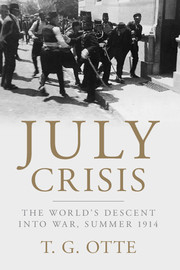Book contents
- Frontmatter
- Dedication
- Contents
- List of illustrations
- List of maps
- Preface and Acknowledgements
- List of abbreviations
- List of the principal dramatis personae
- Europe, 1914
- The Balkans, 1914
- Introduction
- 1 Prelude: the road to Sarajevo
- 2 Sarajevo and its echoes: 28 June to 5 July
- 3 The triumph of tactics over strategy: 6 to 21 July
- 4 Localizing the crisis: 19 to 23 July
- 5 The ultimatum: 23 to 26 July
- 6 Localizing the war: 26 to 28 July
- 7 Escalation: 29 July to 4 August
- Conclusion
- Index
- Plate section
- References
2 - Sarajevo and its echoes: 28 June to 5 July
Published online by Cambridge University Press: 05 July 2014
- Frontmatter
- Dedication
- Contents
- List of illustrations
- List of maps
- Preface and Acknowledgements
- List of abbreviations
- List of the principal dramatis personae
- Europe, 1914
- The Balkans, 1914
- Introduction
- 1 Prelude: the road to Sarajevo
- 2 Sarajevo and its echoes: 28 June to 5 July
- 3 The triumph of tactics over strategy: 6 to 21 July
- 4 Localizing the crisis: 19 to 23 July
- 5 The ultimatum: 23 to 26 July
- 6 Localizing the war: 26 to 28 July
- 7 Escalation: 29 July to 4 August
- Conclusion
- Index
- Plate section
- References
Summary
Voices from the crowd: Bravo! That’s it – Serbien muss sterbien [Serbia must die] – Whether she wants to or not.
KARL KRAUSThe news of the Archduke’s assassination burst on a political scene at Vienna that was seemingly quiescent. In 1914, Sunday, 28 June marked the end of the ‘season’ in the Habsburg capital. Society and political leaders had already dispersed, or were about to leave for the country for the remainder of the summer. But underneath the impression of a capital in holiday mood there was a barely suppressed febrile atmosphere that made officials and their political masters susceptible to suggestions of a military confrontation with the troublesome southern neighbour. They were ever ready to react to the latest provocation with force.
‘Music everywhere’: the reaction in Vienna
The violent death of the Archduke appalled all Europe. This, after all, was a civilized age. ‘An agonized cry of horror resounds across five continents’, wrote the semi-official Pester Lloyd, Hungary’s leading paper. Europe’s monarchs died peacefully in their beds; they were not gunned down in the street. Even The Times carried no fewer than seven news items on the murder at Sarajevo in its issue of 29 June. For a brief moment, the events in far-away Bosnia superseded the grim news from Ireland and attracted the attention of the British press and public. Franz Ferdinand and his consort had made a great impression during their visit to Britain in November 1913, and the Archduke enjoyed a degree of popularity here: ‘It is less than a year since many of us saw the Archduke and his wife enjoying their visit to Windsor seeming to be so happy here, and this too quickens our sympathy.’ King George V himself called on the Habsburg ambassador, Count Albert Mensdorff; the Royal court was in official mourning; and on 5 July, there was a requiem mass at the Roman Catholic Westminster Cathedral, which was attended by several Cabinet ministers.
- Type
- Chapter
- Information
- July CrisisThe World's Descent into War, Summer 1914, pp. 39 - 101Publisher: Cambridge University PressPrint publication year: 2014



